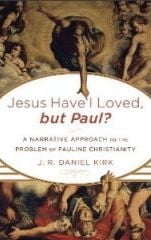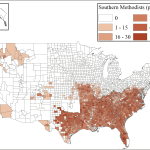 I am writing the final post on the blog tour for Daniel Kirk’s new book, Jesus Have I Loved, But Paul?. You can see all the posts on the tour here at the Blog Tour Hub. I will be engaging the final chapter of the book which is titled “Living Interpretations”. Let me say that I’m honored to read and engage Daniel’s book. I consider him a friend and, at times, it seems we’re living lives in parallel.
I am writing the final post on the blog tour for Daniel Kirk’s new book, Jesus Have I Loved, But Paul?. You can see all the posts on the tour here at the Blog Tour Hub. I will be engaging the final chapter of the book which is titled “Living Interpretations”. Let me say that I’m honored to read and engage Daniel’s book. I consider him a friend and, at times, it seems we’re living lives in parallel.
Summary of Chapter
At the start of the final chapter, Daniel reflects on the kind of book he’s in fact written. He calls the book a “storied theology”. I’m not sure if he coined this term, but it is a good one to sum up what he’s tried to do. He asks rhetorically why it is he has so often stressed the storied nature the New Testament. In three waves he answers those questions.
First, Daniel says he stressed story because for both Jesus and Paul they believed they were the continuation of Israel’s story. It is the story of the God of Israel bringing about reconciliation and rectification of the entire created order. Second, Daniel reasons that story is important because of its power to instruct by embodiment and demonstration rather than simply through systematic propositional assertions. Kirk believes faith is a story narrated not with propositions but in faithful communities and individuals. Third, Daniel affirms his stress on story in the book because story is the means by which we interpret and make sense of our world. Jesus and Paul show us that the key to knowing the proper interpretation of our world is Jesus. In Kirk’s words, “Jesus is the key to our identity and our actions” (195).
Jesus as the climax of Israel’s story is thereby the beginning of the new creation. This inaugurated new creation defines how the people of God should understand themselves and their work in the world. Jesus inaugurated the new creation through his self-giving death and victorious resurrection. The pattern of cruciformity (Jesus’ self-giving death and resurrection) is the pattern of our activity by which we enact the story that both Jesus and Paul lived out. Daniel says
Jesus is the interpretive key not only for reading both the Scriptures and Jesus’ connection to the story of Israel but also for reading our own lives as those who would follow him. Both Jesus and Paul claim through their actions and their words that the principle of interpretation that tells us we are reading the biblical story aright is the same principle of interpretation that will tell us when we are embodying the biblical story aright in our own place and time. In other words, how we read the Bible (hermeneutics), who we are (identity), and how we act (ethics) are inseparable (195).
In practice, Daniel argues that the Christian story should be the interpretive key for how we interpret the world’s story outside the confines of a parochial Christian community. The story should reorient the way we see the world on the outside. If in fact God has enthroned Jesus as Lord over all things, and if that his reign becomes manifest in the world as God’s people carry Jesus’ cruciform ministry beyond the space demarcate by our own Christian communities, then it is the job of the church to effect the truth of the reality of Messiah’s universal Lordship. As Kirk puts it, “Cruciformity is not just about putting to death the sinful desires of our hearts (an individualistic perspective), it is also about bringing to consummation the defeat of the powers that work against all human flourishing and that strive against giving all glory to God” (197).
 The conclusion that Jesus’ death and resurrection gives the church new lenses to see its vocation in the world, leads Kirk to the corollary conclusion that God is working to effect the kingdom outside the work of the church. Kirk asserts,
The conclusion that Jesus’ death and resurrection gives the church new lenses to see its vocation in the world, leads Kirk to the corollary conclusion that God is working to effect the kingdom outside the work of the church. Kirk asserts,
Once we realize that God’s work in Christ is not to save us out of this world but rather to save this world through us (something that is confirmed, above all else, by telling a story that climaxes with the resurrection of the body), we have our eyes opened to surprising signs of life, signs of the story of God breaking through the story lines of the world that narrate life as though it were devoid of God. Then we can begin to interpret the world as a place where Christ is at work, even if there is no member of the church there to be his official spokesman . . . Though the church is the place that is most particularly called by his name, the church as we conceive it is insufficiently broad to contain the whole of the kingdom of God. The church is not the kingdom of God on earth but one manifestation of the reign of God, and the place where, ideally, that reign is being brought to bear on the world. Nonetheless where we don’t see the church, we may still be able to see God at work restoring the world through the power of the Spirit of the resurrected Jesus (197; 199).
Daniel’s primary contention in this chapter seems to be that an accurate understanding of the Jesus story reveals that the point of it all is not simply Jesus becoming Lord of one’s heart. Instead the point of it all is the reality of Jesus’ enthronement as Lord of the cosmos. Thus such a expansive vision of the impact of the story will ensure a comprehensive perspective of discipleship. I think this is ultimately the point of Kirk’s little book. A robust vision that translates into full-bodied devotion to Jesus which expresses itself in real world impact.
Kirk’s affirmation of the close affinity between Jesus and Paul, at bottom, is based on the story of Israel they both share, a story that effects God’s redemptive purposes in history through those whose lives are shaped by it. I think that is ultimately what Kirk is saying. Jesus and Paul wanted to see the same thing in this world: God’s rule enacted through the Messiah’s reign. For Kirk, this shared story and its direct outcome has brought Jesus and Paul together.
Evaluation of Chapter
If I have read Daniel rightly, I am more than sympathetic to his perspective on the relationship between Jesus and Paul. And I am particularly grateful for his stress on the story of Israel within which both Jesus and Paul lived, moved and breathed. I affirm, also, his impulse to see the outcome of the story, or the effects of the story, as utmost important. Jesus lived, died and rose again to enact a Kingdom and new creation. Paul sought though a ministry patterned on Jesus’ death and resurrection to proclaim the good news of the Kingdom to the gentiles for the purpose of bringing about the obedience of faith among them (Rom 1:5; 16:26).
There are however at least a couple of areas in Daniel’s chapter that I think warrant friendly critical engagement.
God’s Kingdom and Israel’s Story
First, I think the primary issue I have with Kirk’s chapter is his instance that the kingdom of God is not the church. And that God is himself bringing about his kingdom outside of the work of the church. I think this assertion is both right and wrong. On the one side, I too believe God’s kingdom is universal and cosmic. I don’t believe that God’s reign can be reduced to the church any more than his presence was contained in the Temple in Jerusalem or his reign was completely contained in the kingdom’s of David and Solomon. In each case, God’s reign and glory were tangibly present, but these expressions by no means represented the extent of either glory or kingdom.
Yet, on the other side, I see no basis for the conclusion Kirk draws that God’s kingdom can be separated from Israel’s story, a story that is now focused in and through the church. It seems to me that Kirk’s own stress on the story of Israel undermines his claim here. While I can see OT examples of God’s activity outside the kingdom of Israel (e.g. Cyrus), these actions cannot be defined as kingdom activity or, if they are, only secondarily so. In this way, Cyrus’ action doubtless contributed to the progress of Israel’s story, and thus the realization of the kingdom of God on earth through the coming of Messiah centuries later.
I believe that God is providentially working all the time in the world, but this activity is not kingdom activity. The kingdom of God is ever and always, according to the narrative at least, the reign and realm of Israel’s Messiah, Jesus, on earth, a kingdom which is at this point is both already, but not yet. The church, in my view, is the Kingdom of God in already-not-yet form. It is the Kingdom of God awaiting consummation.
A Colony of the Kingdom in the Country of Death
Second, the already-not-yet element relates to another point that I take issue with. I am much less optimistic than Kirk about what we as followers of Jesus can accomplish in the work of creation renewal before the consummation at Messiah’s return. I think Kirk is not being apocalyptic enough. I don’t doubt in the least that we as the church are both to proclaim renewal and work at it. I’ve made this point elsewhere before on the blog. I don’t agree with those who wish to prioritize one element of this conjunction over another when it comes to the mission of the church. As obedient followers of Jesus we must both proclaim and procure the kingdom – that’s my view.
However, the church’s activity is always in the context of a fight between the present evil age and the new one we bring. I believe passionately that the mission of the church must be to leave a geographical footprint wherever we step in this world. The places where we live should be shaped toward the kingdom of God because we have been there. However, often our footprint is washed way shortly after we’ve stepped because we are stepping on the old creation in the present age. This creation and this age is stubborn in its antagonism toward God. Much like a footprint on the shores of a beach, within minutes the sand shifts and the waves wash over and our footprints disappear. This I believe is the context of the mission of the church, to use Eugene Peterson’s terms, as a colony of God’s kingdom in the country of death in the time between the times.
*
I could say more, but I think I’ve made a couple substantial points to consider when engaging Kirk’s work. I commend my friend Daniel for his good book.















